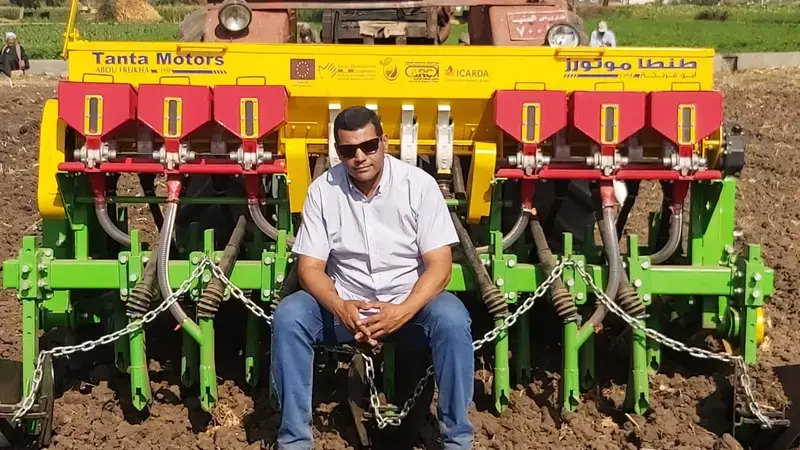Egypt rolls out water-saving smallholder equipment

5 - 6 November. El Minia, Egypt. ICARDA training of farmers.
The Raised Bed Machine (RBM) was developed by the International Centre for Agriculture Research in Dry Areas (ICARDA) in collaboration with Egyptian research centres, public and private sectors, with a view to expanding its use among smallholders in Egypt. It can prepare an acre of agriculture land in half an hour, a task it would take farmers a working day to complete manually, using at least 10 workers.
This is particularly advantageous in a country already experiencing severe water scarcity and where the population is predicted to grow from 92 million to 110 million by 2025, adding to pressure on dwindling resources.
Boosting profits
Although the RBM achieved this with wheat crops when piloted with farmers in Sharqiya governorate, northeast of Cairo, researchers chose to develop it further, to suit other crops and different soils. Most of the smallholders who use it cannot afford to own one themselves; there are just a few owners who have invested in the machinery and charge a fee for its use.
Sowing the seeds
The multifunctional machine has a row of furrow openers which allow farmers to dig water channels in the land, and it can drill seeds into the soil between these channels in a simple mechanical way.
The design was ideal for dense farming for crops such as wheat, alfalfa and barley, however it was not successful with other crops such as sorghum and maize, which are grown using a method called hill planting. This technique involves planting seeds in groups on flat-top circular mounds where the soil stays warmer, plants have greater access to water and nutrients, and roots have more room to expand.
So the machine was developed to also facilitate hill planting, saving effort and money for farmers who use this technique.
Enhancing efficiency
With ongoing investment from the public and private sector, alterations were also made to the RBM’s structure: it was built using stronger materials to suit any land, allowing it to cultivate even untilled ground. As a result, it has become more economically efficient and multifunctional, with greater appeal to agriculture machinery owners.
According to a study by the manufacturers, the machine is expected to have a life span of around 12 years, and within three years the owner can recoup the expenses of purchasing it.
Quality crops
Kamal El-Deen Ibrahim, a manager at the agriculture guidance administration in Minya governorate, explains: “Raised bed planting allows for gaps that give space for wind, and gives the plant strong roots that can resist wind, which helps averting dormancy, which negatively influences the crops.”
Nader Noureddine professor of water resources and land reclamation at the faculty of agriculture, Cairo University, admits it is in the government’s interest to promote the use of the new technology, but adds: “Unless it proved efficient and productive for the farmers, nothing would guarantee its use, even if it saved huge amounts of water. That is why I expect the machine to spread rapidly.”
Original article:
05/11/2019 This article was originally produced by SciDev.Net’s Middle East & North Africa desk.
06/11/2019 Egypt introduces new water-saving equipment to smallholders
23/11/2019 «إيكاردا» تقدم أول ماكينة لزراعة الفول البلدي علي مصاطب لتوفير مياه الري «صور»



